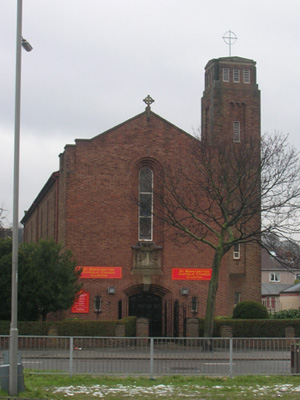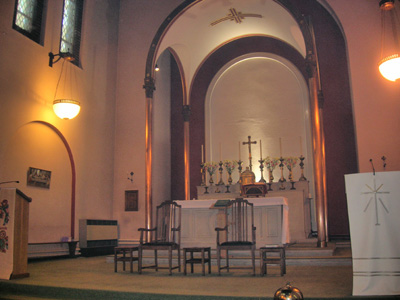 |
||||||||||
 |
||||||||||
|
1391: St Bernadette, Allerton, Liverpool, England Mystery Worshipper: Robertus Liverpolitanae. The church: St Bernadette's, Allerton, Liverpool, England. Denomination: Roman Catholic. The building: Compact church built of soft brown coloured bricks, looking very neat and proper on its corner site. The parish was founded in the 1930s and the exterior has a vaguely art deco look. The interior is surprisingly austere for a Roman Catholic church. The windows are high and contain only small roundels of stained glass. The walls are painted white. The main feature is a great, elegant baldacchino on slim copper pillars over the high altar and tabernacle. Overall the interior is mostly a refreshing change from the more common Gothic churches stuffed with pietistic tat. The church: The noticeboards reveal a number of activities going on in the parish. There appear to be few parishoners from ethnic backgrounds. The parish shares a primary school with a neighbouring parish and there is a large high school nearby which serves all the Catholic parishes in south Liverpool. The people obviously care about their church, as the newsletter contained a profuse thank-you from the parish priest, who, having asked for money to repair the heating system, found the funds given generously and swiftly. The neighbourhood: Allerton remains a green and leafy suburb of Liverpool. It is a largely middle-class and prosperous neighbourhood. The parish does have less well-off areas with the usual urban social problems, but there are few areas of social housing in the parish. It would confound those who like to apply the term Scallyland (used to describe areas frequented by uncouth persons of few social graces) to all of Liverpool. The cast: The Rev. Joseph Keller, parish priest, was the celebrant and preacher. The date & time: Sunday, 11 February 2007, 10.30am. What was the name of the service? Solemn Mass for the sixth Sunday of the year. How full was the building? By the time that mass started, I would estimate that it was about two-thirds full, between 100 to 120 worshippers. Did anyone welcome you personally? Sadly not. I arrived about 15 minutes before the service began, but there was no sign of anybody on greeting duty. I helped myself to missal, hymn book and newsletter. The newsletter carried the legend: "St Bernadette's, Allerton. 'Turning Strangers into Friends.'" But no one greeted this stranger! During the peace, though, there were lots of firm, friendly handshakes and big smiles. Was your pew comfortable? Yes, both for sitting and kneeling. How would you describe the pre-service atmosphere? When I arrived there were about 20 people already inside. Some were talking quietly, others just sitting or kneeling, presumably in prayer. The organ started playing about 10 minutes before the service began, and one or two members of the choir were to be heard warming up. The congregation began to swell about five minutes from kick-off. The last person to arrive seemed to have been one of the altar boys, who ran down the side aisle and into the sacristy moments before mass began. What were the exact opening words of the service? "In the name of the Father, and of the Son, and of the Holy Spirit. Amen." What books did the congregation use during the service? The Sunday Missal and Liturgical Hymns Old and New. What musical instruments were played? A well played organ was the only instrument. There was a choir, which consisted only of female voices. Both choir and organ were situated in a loft at the west end of the church. The choir, shall we say, had some issues (of which more below). Did anything distract you? Just a few things! The church architecture, as mentioned above, is deliberately austere, but the sanctuary was cluttered with unnecessary furnishings (see photo). The sight lines were obscured by a movable font, pascal candle, a small lectern directly in front of the altar which served no purpose in this service, two large chairs and three stools directly in front of the altar. I wasn't sure why two chairs were required, as the parish priest is the only cleric attached to the parish. The altar severs were ill matched, one being much taller than the other. Further, the taller boy wore a cassock-alb while the younger wore cassock and cotta. I was glad to note that the younger server upheld a tradition in vogue when I served at mass in this church more that 20 years ago: shortest possible cassock, longest possible cotta. We got extra points if we managed to get out into the sanctuary with a cotta longer than the cassock. Was the worship stiff-upper-lip, happy clappy, or what? Overall the worship was solemn, but simple. As the mass began, children were invited to adjourn to "little church" (Sunday school). They dutifully trotted off and reappeared at the offertory, joining their parents for the remainder of the service. Fr Keller celebrated mass with a reverence that avoided being either overly pious or routinely dull. He chanted all of the appropriate parts in a pleasant voice with only a few minor errors during the preface. Incense was used appropriately. With only two servers, some ceremonies, such a full gospel procession, could not be carried out. A lay reader read both lessons in a good clear voice. There was an offertory procession. A number of eucharistic ministers assisted with the distribution of communion; they received the Precious Blood via intinction, which is unusual in a Roman Catholic church. 
Exactly how long was the sermon? 15 minutes. On a scale of 1-10, how good was the preacher? 7 – Fr Keller appeared not to be a natural orator, and read his sermon from notes, but he was an effective enough preacher. In a nutshell, what was the sermon about? Father preached on the day's gospel reading, the Beatitutes (Luke 6:17, 20-26), with references to Augustine of Hippo, Thomas Aquinas, Cardinal Newman and, somewhat surprisingly, Cockney punk rock protest singer Billy Bragg. Modern society, and particularly youth culture, is in the thrall of a money-obsessed celebrity lifestyle. Superficial material possessions may provide us with security and happiness, but in the process they rob us of really experiencing the world. This affects younger people more, as they go to their gadget-filled bedrooms and lose any sense of community or interaction with their peers and elders. The Beatitudes give us a radically different approach to how to live. In the past, experiments in an alternative social order, such as the Diggers in the aftermath of the English Civil War, were quickly stamped out as a threat to those in power. (This is where the reference to Billy Bragg came in, as his song "The World Turned Upside Down" is about the Diggers.) Basically wealth has made us poorer. Things were so much better a few generations ago, when there was no crime. (Here the sermon deteriorated into a rant against the "wretched" Government, for which I deducted one point from his score.) Which part of the service was like being in heaven? It was nice to see so many children in church, and all so well behaved. Fr Keller, although by no means a natural comedian, attempted to engage the children during the announcements with a joke. I liked the solemn simplicity of this celebration. There was a palpable community atmosphere which became even stronger at the end of mass, when we were asked to pray for the sick and housebound of the parish while Fr Keller gave pyxes to three of the eucharistic ministers. The ministers then left the church via the central aisle to take holy communion to those unable to attend mass. I found this a touching ceremony – if only there had been two acolytes with lights to lead them to the church door. And blessedly, this is the only church I've been to recently with no latecomers! And which part was like being in... er... the other place? Only one, but an important one: the music. Some of the music was just plain bad! Except for the Kyrie, which was sung in Greek to a proper chant setting, the remainder of the service music was sung in English in what might be called a folk idiom. Now religious folk music is OK in its place, but that place is somewhere back around 1975. The Agnus Dei was so ridiculously jaunty and silly that it almost made me laugh out loud. The hymns were well chosen as far as the words were concerned, but musically they were less successful. The congregation began each hymn with gusto, but as the line rose, more and more people dropped out so that in the end almost nobody was singing other than the choir. Indeed, at points the tessitura was too high even for the choir, and there were some very unpleasant cracking voices. The choir did sing a nice offertory anthem, though, with a pleasant Celtic lilt to it, and varied their dynamics in an intelligently musical way. My advice as a trained musician? Dump the folk and concentrate on the plainchant. And try hard to recruit some male voices. What happened when you hung around after the service looking lost? A few smiles, but nothing else. How would you describe the after-service coffee? Sadly, none offered. Looking once more at the newsletter, I saw the following quotation from the Catholic Bishops' Conference publication "Celebrating the Mass:" "The idea of strangers gathering for eucharist, and remaining strangers thereafter, does not sit easily with the Gospel message." Theory and practice seem to be at odds here. How would you feel about making this church your regular (where 10 = ecstatic, 0 = terminal)? 8 – Twenty years ago or so, this was my parish church. I would quite happily come back if I didn't live about 200 miles further south. This parish has many things going for it and lots of potential. Did the service make you feel glad to be a Christian? Yes, I was glad to have been at this mass. What one thing will you remember about all this in seven days' time? Despite the overwhelming positive impression, the thing I'll remember is the awful music. |
|
|
||||||||||||||||||||||||||||||||||||
| More Mystery Worshipper reports | |||||||||||||||||||||||||||||||||||||||
 |
|||||||||||||||||||||||||||||||||||||||






